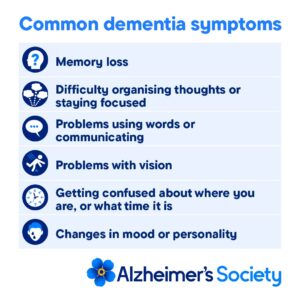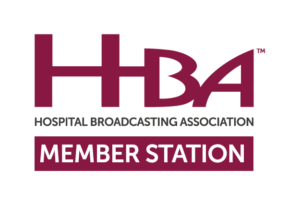Almost half of people with dementia in Wales remain undiagnosed, Alzheimer’s Society Cymru highlights the six key symptoms to look out for.
This Dementia Action Week (19-24 May) Alzheimer’s Society Cymru is shining a light on the six most common symptoms of dementia and encouraging people to seek help if they spot these signs in themselves or a loved one.
Over 50,000 people are living with dementia in Wales and around half do not have a diagnosis. Yet, new research by the charity reveals that around 50% of adults in Wales do not know that problems with vision changes can sometimes be a symptom of dementia – and one in ten could not name a single common symptom of dementia.
Dementia can affect vision in different ways, including problems judging distances (such as on stairs), perceiving the edges of objects, or misinterpreting patterns or reflections. It can also make reading large text more difficult, or cause issues with recognising objects.
The survey also found that across the UK less than two-thirds of respondents identified that problems with communication (61%) or mood changes (64%) were symptoms of dementia.
Alzheimer’s Society Cymru Country Manager, Rachel Nelson, said:
“At Alzheimer’s Society, we see too many people delaying seeking a dementia diagnosis because they’re scared or unsure what it will mean.
“A diagnosis is not the end. It’s the beginning of getting the right support, making informed choices and living well.
“That’s why it’s so important to raise awareness this Dementia Action Week. We want to encourage everyone to learn more about the symptoms of dementia and support them in seeking a diagnosis.
“At Alzheimer’s Society, we’re here every step of the way. We can offer expert advice, support with local services and a listening ear.
“We give advice and practical guidance for the next steps as people living with or supporting someone with dementia navigate the hardest time of their lives”.
Corinne Mills, Interim CEO of Alzheimer’s Society said:
“This Dementia Action Week, we’re highlighting the six most common symptoms of dementia and encouraging anyone with concerns to use our free symptom checklist and seek help from their GP or other health professional.”
“More than a third of people with dementia don’t have a diagnosis, meaning they’re missing out on the vital care, support, and treatment they need. But it doesn’t have to be this way. We understand that getting a diagnosis can be daunting, but we believe it’s better to know.”
“Our research shows that 97% of people affected by dementia saw a benefit in getting a diagnosis. An early and accurate diagnosis helps people to live independently for longer, access existing treatments, and can prevent crisis situations. It also allows people to better understand their condition and plan for their future.”
Dementia is not a natural part of ageing. The six most common symptoms of dementia include:
- Memory loss – problems recalling things that happened recently
- Difficulty organising thoughts – struggling to make decisions, solve problems or follow steps
- Problems with communication – difficulties following conversations or struggling to find the right words
- Problems with vision – problems judging distances or perceiving object edges
- Getting confused about time or place – losing track of the time or date, or becoming confused about where they are
- Changes in mood or personality – becoming unusually anxious, irritable, or withdrawn
Finding the reason for any changes can help those living with dementia get the right information, treatment, and support. It can also help people and those around them to understand the changes they are experiencing and maximise the time spent with loved ones. It also allows people to plan by putting in place lasting power of attorney, exploring care options, managing finances, and accessing any benefits they may be entitled to.
If you’re worried about yourself, or someone close to you, then check your symptoms today. Visit alzheimers.org.uk/checklist or call Alzheimer’s Society’s Dementia Support Line on 0333 150 3456, for Welsh language support call 03300 947 400.






